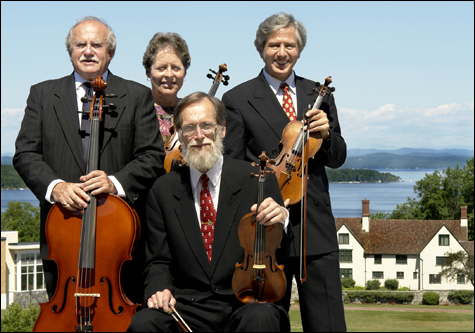
FOUR OF A KIND: The Portland String Quartet. |
| Portland String Quartet | with Cheryl Tschanz | 3 pm March 2 | at Woodford’s Congregational Church, Woodford St, Portland | $20; 21 & under free | 207.761.1522 |
As the Portland String Quartet approach their fortieth year and the possibility of being the world's oldest continuing string quartet with the same members (The Guinness Book of World Records is looking into this claim), they will be teaming up with pianist Cheryl Tschanz to present what promises to be yet another incredible concert for the people of Portland.Classical-music connoisseurs in Portland may have begun to take the Portland String Quartet for granted, but as the group prepare for an incredible season of international travel and a new CD release, seeing this ensemble perform at their “home base,” the Woodfords Congregational Church, almost feels quaint.
Any opportunity to see Maurice Ravel’s String Quartet in F Major performed by musicians of this caliber should always be taken. Often linked with the equally popular string quartet by fellow composer Claude Debussy, the edgier Ravel pushes the limits of the Impressionist period in which it was written and, in its more rhythmic moments, foreshadows Stravinsky. The controversial nature of the work effectively caused Ravel’s expulsion from the Paris Conservatory and it was not until Debussy praised it as a work of utter musical perfection that Ravel accepted it as the musical masterpiece that it is. The haunting melodies, punctuated with sharp pizzicato and heavily laden harmonies formed deep within the hollow bodies of the instruments, give the quartet the feeling of having been composed and written in Ravel’s own blood.
“The Ravel is lush in a French way; the Brahms is lush in a German way,” says PSQ cellist Paul Ross of the other masterwork to appear on Saturday’s program.
The Brahms Piano Quintet in F minor, which the PSQ will perform with award-winning Colby College pianist-in-residence Cheryl Tschanz, is one of the most commonly recorded and performed piano quintets. Written just forty years before the Ravel, the Brahms could not be a more different piece of music. Driven by the composer’s intricate melodies, the work plows through emotions like a character in a Bronte novel. Brahms churns through the flawless and graceful four movements with clear intention and an artistic vision that would come to define the German music of the Romantic period.
The PSQ’s selection of Gustav Mahler’s very early and unfinished Piano Quartet Movement in A minor is an interesting addition to a concert of chamber-music heavyweights.
“The Quartet is not as out there as his later symphonies, but you still know it’s Mahler,” says Ross.
Not often performed, the work is one of very few chamber pieces by the famous composer of symphonies. Mahler completed and published only one movement of the quartet while a student at the Vienna Conservatory, although sketches of a scherzo have survived. This work contains the gentle complexity Mahler would later explore in greater depth in his intricate symphonies.
The PSQ have been invited to perform at the Israeli Music Festival in June 2009, where they will perform the Israeli premiere of a piece by the director of the festival, Israeli composer Gil Shohat. And this October, they will handle the American premiere of the same piece at Harvard.